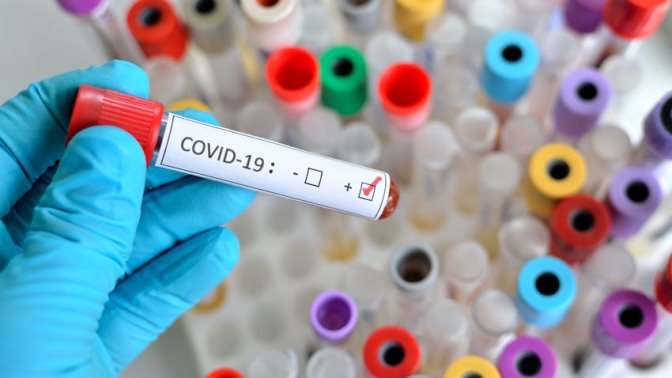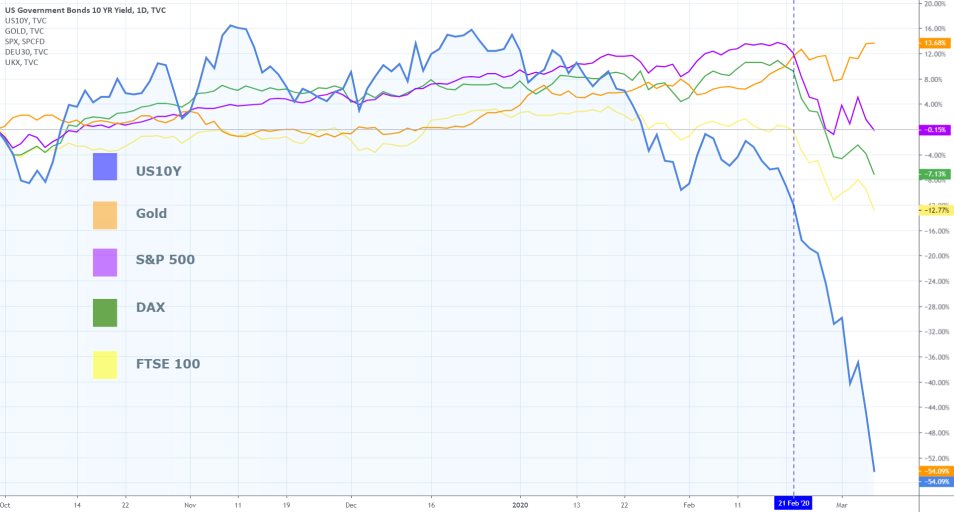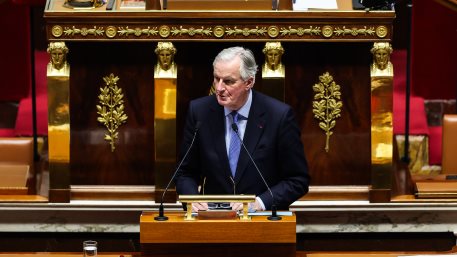
When investors try to diagnose the economy themselves
Most people may not even realise that they have contracted the novel coronavirus at first. According to the World Health Organization (WHO), the symptoms of COVID-19 in infected people include shortness of breath, coughing, fever and other general respiratory complications. That is why it is so easy for the new coronavirus to be mistaken for common influenza.
People are advised to go and see a health professional when they are not certain about whether they have contracted the new virus or not. An expert’s opinion is needed so that there can be no mistake when diagnosing one’s condition. Most people demonstrate the necessary attentiveness and the demand for clinical tests for COVID-19 is high. People's impartiality in infected areas is in stark contrast with the general market participants’ urge to diagnose the global economy with symptoms that pertain to the coronavirus.
Whether or not market participants worldwide were justified in fleeing the global stock market en masse the week before last, which caused a trillion-dollar plunge, can only be justified in hindsight once the coronavirus epidemic is eventually mitigated. But even if their worst fears are warranted, and the global economy is indeed heading for a new recession, their actions now are part of the underlying issue.
The general panic that has swept through the global markets is mostly owing to the premature assertion that the coronavirus epidemic has the capacity to prompt a new recession. But why are so many investors and traders out there who are ready to ascertain that the global economy is about to contract considerably?
People were expecting a general market correction to form even before the coronavirus was discovered in Late-December 2019. Most people are contrarian by nature, which compels them to think in opposites, and is the prime reason why everybody is so eager to ascribe various “evidence” as the likely initial causes of a new recession.
This, of course, is a characteristic of the confirmation bias – looking for external evidence to fit into the context of one’s presuppositions. That is how people 'recognise' patterns by twisting the underlying data and ultimately end up making mistakes, similarly, to a stranded man in the desert who misconstrues a mirage for an oasis.
The stock market was performing exceptionally well prior to the outbreak of COVID-10 in the Hubei province of China, and it was showing no signs of slowing down. At that time, habitual market antagonists were looking high and low for the eventual roadblock to global growth, which would finally curb the expansion of the stock market.
They are not driven by the desire to see a recession unfolding. Rather, they are compelled by an innate feeling of ‘catching the next new thing’, and a market correction is the logical opposite to a bullish market. So, all the pieces fit together when the virus went global.
It was almost too easy to perceive the virus, which quite easily distorted international supply networks in a matter of weeks, as this long-anticipated new threat that is finally going to throw the global economy into chaos.
Whether people are overexaggerating or underestimating the threat of COVID-19 to global growth is going to be shown in the aftermath of the situation, once everything tones down. For now, the only thing that can be stated with certainty is the immediate economic impact in the wake of the virus’ global outbreak.

As can be seen on the chart above, all major indices, including the S&P 500, the FTSE 100 and the German DAX, tumbled when it was announced that the coronavirus broke away from containment in China, and started spreading globally. Meanwhile, the 10-Year US bond’s yield, which is considered among the most secured assets in the world, fell below the 1 per cent mark for the first time ever.
This underpins the rapidly rising demand for low-risk financial assets, commonly referred to as safe-havens. Gold, which is on such asset, continued rising on the same investors’ fears.
Capital flight to low-risk assets draws money away from the general circulation of the broader economy. As aggregate investments diminish, businesses have less capital to expand their operations, which leads to muted business activity. All of these factors comprise a single chain of events, which, when triggered, cause rippling effects in the economy leading to contraction, and potentially to a new recession.
Such a line of reasoning worries investors and other market participants, as they connect the dots and start anticipating a new recession. However, are they justified in attributing the economic symptoms of COVID-19 to muted growth, similar to the 2008 credit crunch? Are they justified in diagnosing a new recession?
People are already comparing the recent market selloff to the early stages of the last recession, which is quite reminiscent of the pattern-recognising desire of people that is driven by the cognitive desire to understand events and developments. The market is currently grappled with investors' fear resembling the panic in the early stages of the 2008 Credit Crunch, but there are notable differences.
Back then, the underlying issue was the mishandling of debt, which had lasting and profound consequences for the global economic system. The coronavirus, in contrast, hit the global markets hard, seemingly from nowhere. The virus does not hold any intrinsic threat for the global economic stability. Its overall impact can be rehashed as being driven solely on speculation.
Once the outbreak is diminished and the panic subsides, there will be no other apparent threats left, unlike the long-lasting credit issues that were left in the wake of the 2008 selloff. In that sense, it can be argued that COVID-19 is just as drastic but much less pronounced than the debt bubble of 2008.
Nevertheless, the underlying speculations from the coronavirus’ spread could become a catalyst for a more substantial and lasting selloff, if they trigger dormant investors' fears. In other words, investors could unintentionally cause a recession with their actions by overestimating or underestimating the significance of the coronavirus for the global supply network.
Essentially, there is a very thin line between a long-lasting recession and a temporary tremor in global growth. The scales can be tipped over in either direction, depending on how investors behave.
For the time being, I will allow myself to use the words of Comrade Dyatlov from HBO's hit miniseries 'Chernobyl' to describe the market selloff – not great, not terrible. The damage is not irreversible, and a new recession can yet be avoided.
Unlike Dyatlov’s delusional optimism, however, market participants cannot allow themselves to misevaluate the very real threat to the global economy. One thing is certain at the present moment – diagnosing the global economy with the coronavirus without understanding the entire picture could inadvertently cause the very thing that investors are currently trying to avoid.




















